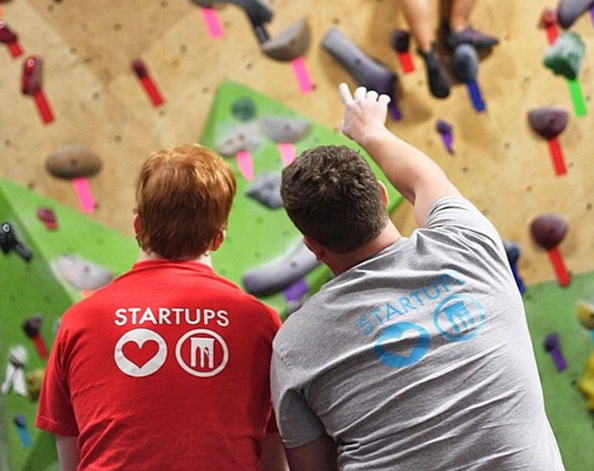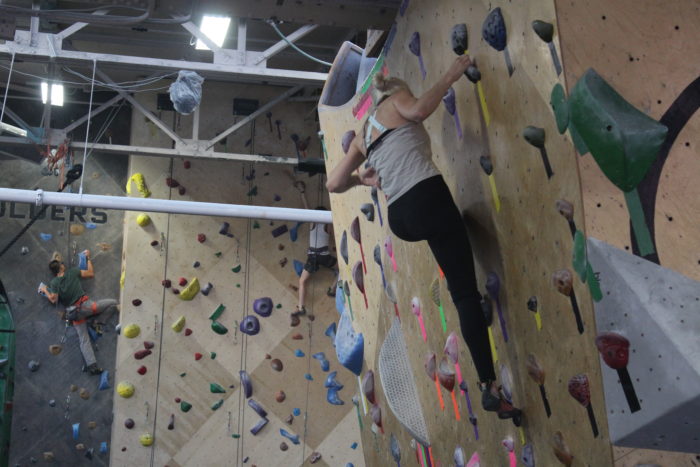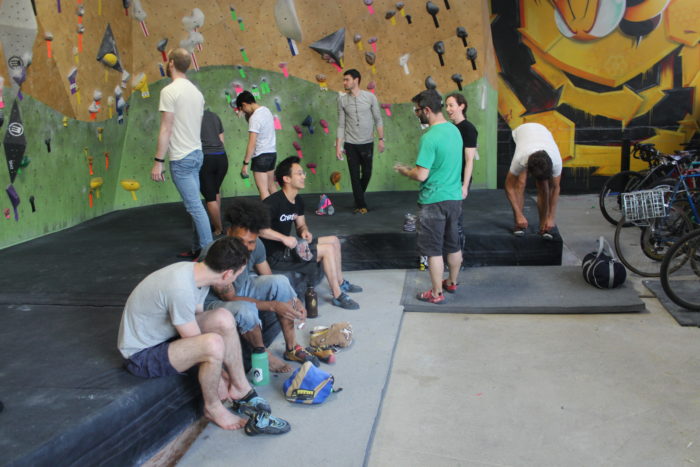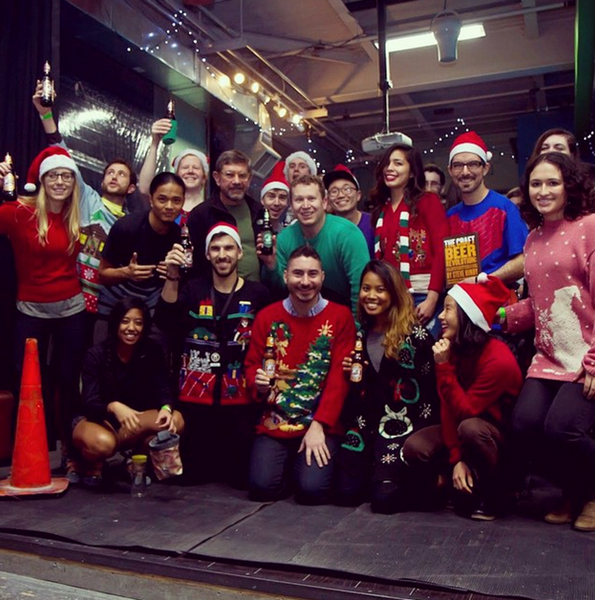How Startup Friendships Grow on a Climbing Wall
Not your ordinary networking event, a meetup launched at Brooklyn Boulders has thrived on collaboration
Participants at a Startup Climbing event compare notes on strategy (Photo courtesy of Startup Climbing)
Networking events are seldom referred to as “fun.” Moriah Rahamim of Roko Labs, an app-development company, can attest to this. They often feel forced, she says. “I’m not in love with classic networking events.” Rahamim, however, found herself fully engaged at a recent networking meetup in Gowanus, where the only pressure was the law of gravity. At the monthly Startup Climbing event at Brooklyn Boulders, participants scale simulated rock walls in between chats about their business ventures or their dreams of starting them. Since it was launched in 2014, the event has grown to include guest speakers, dance parties, and enthusiastic crowds.
While Silicon Valley has its startup rides, with cyclist entrepreneurs pedaling furiously around the Bay Area, Startup Climbing has a more relaxed atmosphere. “It’s very low key. It gives you something else to do besides sitting in a room,” says Michael Hochbaum, who works at Dotdash (formerly About.com). Hochbaum has a theory about rock-climbing’s appeal to people in technology industries. “Rock climbing involves solving complex problems: ‘Where is my foot supposed to go? How about my hand?’ This problem-solving makes the sport especially relevant.”

A climber scales a bouldering wall, above rubber mats that cushion a fall if climbers slip off their handholds (Photo by Arden Phillips)
Tim Flannery, a partner in the VC firm Pilot Mountain Ventures, launched Startup Climbing with the aim of cultivating real friendships at their events rather than the usual what-can-you-do-for-me attitude that such events can bring out in people. Flannery was joined in the venture by Scott Smith, a marketing-automation specialist, who helped grow the organization with help from Brooklyn Boulders, which itself has been expanding. “The first event had three people, and in truth it was more just a few friends getting together with an excuse to climb. Tim had seen some crossover between startup people and climbers and thought it might make an interesting gathering. The next event had six people, and the first time it got on Eventbrite, we sold nine tickets.” Since then, the event has taken off, with thousands of participants in the network and climbing events in six other cities from Boston to Los Angeles.

Climbers are a particularly friendly bunch, the organizers assure prospective joiners (Photo by Arden Phillips)
The keys to getting the organization off the ground, said Smith, were a lot like the qualities necessary for the sport. “Getting it going takes patience, and then essentially just the willingness to have fun. The group was never really started as a money-making venture, but being at the center of a community like this became appealing as the event sizes grew. We got lucky with our networks, getting some awesome speakers early on that propelled our numbers to 60 to 80 people an event,” said Smith. “Our biggest event was a jointly promoted, ugly-sweater holiday climbing party. Steve Hindy, the founder of Brooklyn Brewery, came to speak, brought a ton of beer, and we ended up with 150 people and a great dance party.”
Culturally, rock climbing and the tech world seem like a good fit. Rahamim thinks that it may have something to do with the openness and quirkiness of both industries, “Rock climbing is untraditional and so is the tech industry. Both are also very casual,” she said. “I could see why someone who likes to rock climb would want to work in tech. They both provide a laid-back atmosphere.”

On a recent holiday, climbers donned ugly sweaters for the occasion (Photo courtesy of Startup Climbing)
After the participants spend time climbing, they share a few beers and conversation. Occasionally, the event also features a guest speaker. “We’re always open to startups with a story that want to share it. We’ve had some great names in the past.” Free beer is provided by Sierra Nevada, one of the event’s sponsors. Another is SendGrid, a company that “gives us free email services and a subsidy that allows us to keep ticket prices low,” said Smith.
At the recent event, Brooklyn Boulders filled up quickly. The Startup Climbing participants each had a name tag that also noted their experience level. What becomes clear, watching the climbers interact with each other, is how collaborative the sport can be. When you’re climbing (and sometimes slipping and falling), there’s a certain energy present that’s stripped of tension. The ability to physically help other climbers when they tumble is a great way to bond. As the event’s invitation assures first-timers: “Climbers are extraordinarily friendly. We’ve had people come to our event for the very first time and feel like they found a new family when they left. Don’t sweat it. We’re all struggling on the wall together.”













